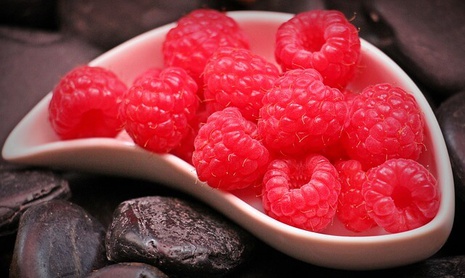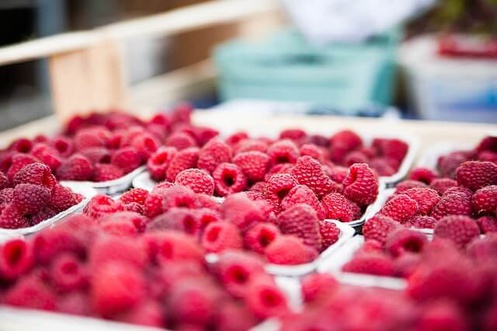Why do I eat raspberries?
Raspberries are much more than just a delicious summer fruit. This fruit also offers an interesting nutritional contribution that can help your body to get rid of diseases, while keeping you in shape. They are packed with a variety of important nutrients and have a low glycemic index. Raspberry is an almost perfect food that should be eaten very often.
A real HEALTH food!
Truth be told, most people don't need much encouragement to eat a bowl of raspberries, fresh and organic. And yet, the benefits of the fruit extend far beyond a tasty feast. Raspberries are a rich source of anthocyanidins, flavonoids (such as quercetin and kaempferol), hydroxybenzoic acids (including ellagic acid) and resveratrol, to name a few. A majority of these phytonutrients not only protect cellular health but also help regulate enzymes that trigger inflammation, thereby reducing the risk of chronic diseases such as obesity, type 2 diabetes and cardiovascular disease. The most important nutrient is ellagic acid, a compound with remarkable anti-inflammatory properties. In addition, the George Mateijan Foundation notes:

"The anti-cancer benefits of raspberries have long been attributed to their antioxidant properties and anti-inflammatory phytonutrients. In animal studies involving breast, cervical, colon, esophageal, and prostate cancers, raspberry phytonutrients have demonstrated an important role in decreasing oxidative stress, reducing inflammation, and thus altering the development or reproduction of cancer cells. But new research in this area has shown that the anti-cancer properties of raspberries may extend beyond their antioxidant properties and anti-inflammatory aspects. The phytonutrients in raspberries may also be able to alter the signals that are sent to potential or pre-existing cancer cells. In the case of existing cancer cells, phytonutrients such as the ellagic tannins in raspberries may be able to reduce the number of cancer cells by sending signals that encourage cancer cells to self-destruct, which is actually a programmed cell death cycle (apoptosis). "
Not all raspberries have the same qualities!
Interestingly, a study published in the Journal of Food Composition and Analysis found that certain types of Rubus raspberries showed "remarkably different phytochemistry and biological activities. "The team found that extracts of Rubus jamaicensis "had the greatest potential to inhibit cancer cell growth, inhibiting colon, breast, lung, and human gastric tumor cells by 50 , 24 , 54 and 37 percent, respectively. "And while all raspberries provide exceptional amounts of phytonutrients, Rubus jamaicensis is the champion among related species for conferring the best protection against cancer.

In addition, a natural phenolic compound in red raspberries has been shown to reduce the incidence of obesity. Nutrition and functional food scientists from a research team in Seoul, Korea fed raspberry ketone (RK) to male mice, which then prevented weight gain from a high-fat diet. The success of raspberry ketone is due to the increase in the secretion of adiponectin - a hormone that helps block fat deposits. The team believes that "RK holds great promise as a medicinal plant because its biological activities modify lipid metabolism. "
Sources for this article include:
http://science.naturalnews.com/pubmed/20425690.html
http://www.sciencedirect.com/science/article/pii/S0889157509002622
http://www.whfoods.com/genpage.php?tname=foodspice&dbid=39
http://www.sciencedirect.com/science/article/pii/S0308814609002787
http://www.raysahelian.com/adiponectin.html



